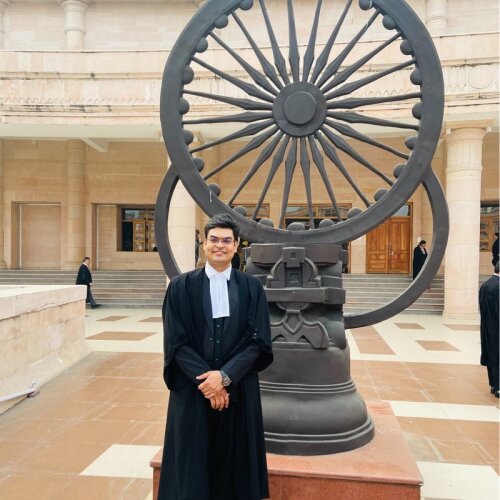Best Bankruptcy & Debt Lawyers in Lucknow
Share your needs with us, get contacted by law firms.
Free. Takes 2 min.
List of the best lawyers in Lucknow, India
India Bankruptcy & Debt Legal Questions answered by Lawyers
Browse our 2 legal questions about Bankruptcy & Debt in India and read the lawyer answers, or ask your own questions for free.
- Loans
- Currently I am multiple unsecured loans. Due to mental health issues I lost my job and all assets. So should I go for Individual bankruptcy?
-
Lawyer answer by Quartz Legal Associates
Based on the facts shared, it is explained that at present, individual bankruptcy in India is not governed by the Insolvency and Bankruptcy Code (IBC) because the provisions relating to ordinary individuals have not yet been implemented by the Government....
Read full answer - Sir, I have to take my payment from my customer party & he is not paying
- Sir, I'm doing textile business & have supplied fabric to my party amt is 4,12,536/00. My customer is not giving payment still he is capable.
-
Lawyer answer by Quartz Legal Associates
Based on the facts stated, it is my considered opinion that you have supplied fabric worth ₹4,12,536 to your customer in the ordinary course of your textile business, the goods have been duly delivered and accepted, and despite being financially...
Read full answer
About Bankruptcy & Debt Law in Lucknow, India:
In India, the Insolvency and Bankruptcy Code, 2016, is the governing law for bankruptcy and debt related matters. This unified national law is applicable in Lucknow as well. The law aims to consolidate all insolvency and bankruptcy laws in India to address the issue of default in repayment of loans. It provides a time-bound process for insolvency resolution of individuals and corporate entities.
Why You May Need a Lawyer:
Engaging legal help when dealing with bankruptcy and debt related cases is recommended due to the complexity of the Insolvency and Bankruptcy Code. If an individual or a corporation is unable to repay their outstanding debts, they need legal advice to navigate the process of declaring insolvency, negotiating with creditors, or restructuring debt. Alternatively, if you are a creditor, a lawyer can help you understand your rights and recover your dues from insolvent entities.
Local Laws Overview:
The Insolvency and Bankruptcy Code works on two primary aspects: Insolvency Resolution and Liquidation. The resolution process must be completed within 180 days from the date of admission of the application. An insolvency professional administers the process. If the default is not resolved, the assets of the debtor are liquidated to repay the creditors. The National Company Law Tribunal (NCLT) is the adjudicating authority for insolvency resolutions for companies, while the Debt Recovery Tribunal (DRT) oversees insolvency resolutions for individuals and partnerships. In Lucknow, these national laws are applicable without any specific local changes.
Frequently Asked Questions:
1. What assets can be included in the bankruptcy estate?
All legal or equitable interests of the debtor at the time of the bankruptcy filing, can be considered part of the bankruptcy estate.
2. What happens after the completion of the insolvency resolution process?
If the insolvency resolution process does not result in an agreement between debtor and creditors, the entity goes into liquidation, where its assets are sold to repay the creditors.
3. Can a debt be discharged in bankruptcy?
Debts such as domestic support obligations, some taxes and debt for most government funded or guaranteed educational loans or benefit overpayments cannot be discharged.
4. What is the role of the insolvency professional?
An insolvency professional is appointed to manage the debtor's assets, entertaining creditors' claims, and conducting the entire resolution process.
5. Can arrangement with creditors stop bankruptcy proceedings?
Yes, a debt settlement agreed upon by the debtor and a majority of credible creditors can potentially halt bankruptcy proceedings.
Additional Resources:
The Insolvency and Bankruptcy Board of India (IBBI) is the regulator for overseeing insolvency proceedings and entities like Insolvency Professional Agencies (IPA), insolvency professionals (IP) and Information Utilities (IU) in India. Up-to-date information can be found on its official website. The National Company Law Tribunal (NCLT) and Debt Recovery Tribunal (DRT) websites also have relevant information.
Next Steps:
If you are facing bankruptcy or debt-related challenges, it is recommended to seek legal advice. An experienced lawyer in bankruptcy and debt law can guide you through the process, help protect your rights, and ensure the best possible outcome. You can contact the local Bar Association in Lucknow for referrals.
Lawzana helps you find the best lawyers and law firms in Lucknow through a curated and pre-screened list of qualified legal professionals. Our platform offers rankings and detailed profiles of attorneys and law firms, allowing you to compare based on practice areas, including Bankruptcy & Debt, experience, and client feedback.
Each profile includes a description of the firm's areas of practice, client reviews, team members and partners, year of establishment, spoken languages, office locations, contact information, social media presence, and any published articles or resources. Most firms on our platform speak English and are experienced in both local and international legal matters.
Get a quote from top-rated law firms in Lucknow, India — quickly, securely, and without unnecessary hassle.
Disclaimer:
The information provided on this page is for general informational purposes only and does not constitute legal advice. While we strive to ensure the accuracy and relevance of the content, legal information may change over time, and interpretations of the law can vary. You should always consult with a qualified legal professional for advice specific to your situation.
We disclaim all liability for actions taken or not taken based on the content of this page. If you believe any information is incorrect or outdated, please contact us, and we will review and update it where appropriate.
Browse bankruptcy & debt law firms by service in Lucknow, India
Lucknow, India Attorneys in related practice areas.









